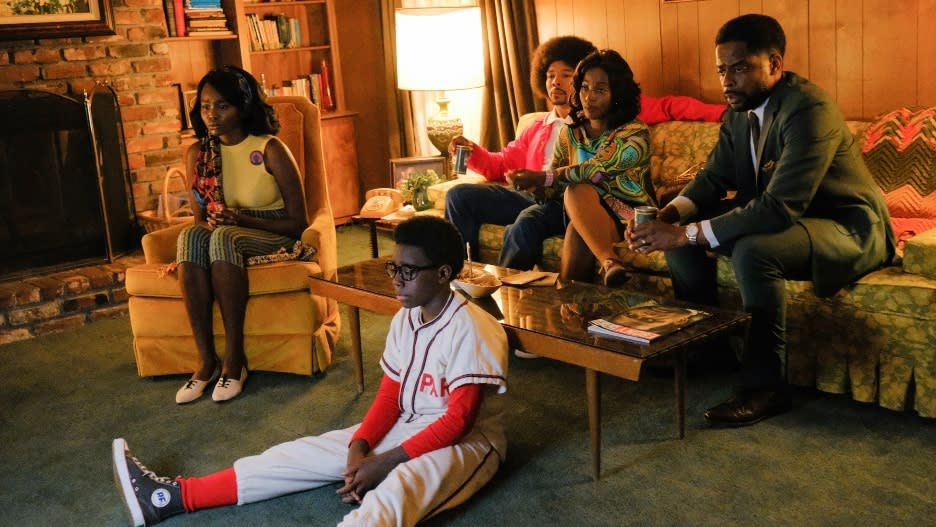How ABC’s New ‘The Wonder Years’ Reimagines a TV Classic Through the Black Experience
ABC is going back to the wonder years of the late 1960s with a new version of the beloved coming-of-age comedy “The Wonder Years” that swaps out Fred Savage’s Kevin Arnold for Elisha Williams’ Dean Williams.
In doing so, the Lee Daniels-produced remake focuses that time period around a middle class Black family in Alabama. For showrunner Saladin Patterson, it was a chance to showcase an aspect of Black culture that has rarely been seen in entertainment. “We have not seen the middle class Black experience on TV during the civil rights movement, during the turbulent ’60s,” Patterson tells TheWrap. “We have seen Black stories, a lot of Black stories, but it hasn’t really been an experience of the Black middle class, specifically showing how, first of all, there was a Black middle class.”
Patterson, who was born in 1972, four years after the time period where the show begins, based a lot of “The Wonder Years” on his own upbringing in Alabama and the stories his parents told him about those years.
“For the first time in America, having upwardly mobile professions that allow for leisure time and vacation time, wanting a safe environment and safe schools for your kids, all those sorts of things,” he said. “But the Black middle class had, obviously, extra obstacles. So we just kind of walk you through that perspective.”
That was one of the reasons that Patterson and his team decided to keep the show in the same period as the original version, which ran from 1988 until 1993 (but took place beginning in 1968). That decision meant diverging slightly from the original series’ conceit, in that it featured an older narrator (in this case, Daniel Stern) looking back 20 years in the past. Each season was set exactly 20 years prior to when the show aired.
Patterson felt that were they to follow that same formula with the new version, setting it in 2001 wouldn’t carry the same weight. The parallels between 1968 and 2021 were too striking too ignore, from racial justice movements to a contentious political environment — there was even a pandemic.

“We started developing this in 2019. So this was pre-pandemic,” Patterson said. “So this was before the summer 2020, the summer of racial reconciliation, racial awakening, with the George Floyd incident. So even before then, the parallels were striking in terms of what’s going on the country now. So all that felt like good reasons to really use it as a kind of a mirror reflecting today’s society in our way that, had we set it in 2000 or 2001, I don’t think we’d actually be able to comment as much about, or at least reflect as much about what’s going on today.”
The new “Wonder Years,” which debuts Sept. 22 at 8:30 p.m., sandwiched in between “The Goldbergs” and “The Connors,” is set in Alabama during the height of the civil rights movement and desegregation. Along with Williams, the series stars Dulé Hill, Saycon Sengbloh and Laura Kariuki as the new family at the show’s center. Don Cheadle narrates as the older Dean, much like Stern did in the original series. Other cast members include Julian Lerner and Amari O’Neil as Dean’s friends Brad and Cory, and Milan Ray as Keisa Clemmons, a young girl Dean has a crush on (an obvious parallel to Danica McKellar’s Winnie Cooper from the original series).
The new “Wonder Years” shares much of the same DNA as the original (including the same network), in that it features a narrator looking back at his formative years and a middle class family at the center. The show even counts Savage as an executive producer. “There’s a lot of elements in this show that feel very comfortable and familiar to me, and to an audience, as well,” Savage said last month during the show’s panel at the television critics press tour. “We’re maintaining similar tone, a similar blend of comedy, truth, this same idea of a narrator looking back, you know, kind of the wisdom of age.”

But while that overall tone and vibe may be the same, that’s where the similarities stop. “In a lot of ways I’ve been trying to have my cake and eat it too. I’ve been very careful to like always refer to this as reimagining and not a remake,” Patterson said. “I want this to be a story about a new family that was very different from the Arnolds. They’re not down the street. They’re in their own world.”
But a Black 12-year old coming of age during that time period had a very different experience than his White counterparts. Namely, having to deal with intense racism and integrating schools, especially when living in a Southern state like Alabama.
Since “The Wonder Years” is ostensibly a comedy, the showrunner said that the goal was to find the lighter moments even in the midst of heavier themes that, for good reason, are more often depicted more in dramas. “I will speak for my family. We actually laughed; we actually had moments that were happy,” Patterson explained. “That doesn’t discount the reality of the struggles in the civil rights movement. It doesn’t discount the racism of Alabama at that time. It’s a testament to the human condition and Black people, specifically, that, in spite of all that, we still had joyous moments.”

